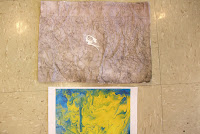Here's the exerpt that stood out to me:
Brooks: . . . This cognitive revolution is giving us a more accurate view of human nature that we are not only the rational, incentive based, the linguistic, logical parts of our mind, but we have other processes which are associational, which are emotional, and this is how we really navigate the world.
So to me this is just exciting in its own way, but also solves my problems, my problems of why we've had so many policy failures by giving us a more accurate view of human nature and how people are likely to respond to different situations.
CHARLIE ROSE: It's stunning.
And, you know, when I talk to all these people and frequently say "What's the one question you most want to answer?" It's always about the unconscious. There is this ultimate fascination with, as what you say, how much of what we do is unconscious, and how deeply influential it is in terms of all relationships we have.
DAVID BROOKS: Right. And to me, the metaphor that helps me understand it is the conscious is like a general, distanced from the world, looking down on it. The unconscious are like scouts, millions of them, permeating the world, going into other minds, going into an environment and sending back these emotional signals -- go, no, go.
And so when you look at a menu, you can make a choice of what you want, but you do not have a choice of whether you like broccoli. That's happening unconsciously. If you describe to me a story of incest, I have an immediate moral reaction to that. That's all done unconsciously.
And, you know, so one of my favorite little science experiments are people named Dennis are disproportionately likely to become dentists. People named Lawrence are disproportionately likely to become lawyers, because unconsciously we have a preference for things that are familiar and we follow those things.
And by now there are now 30,000, 40,000 neuroscientists in the world as well as other fields, and they're reshaping the way we understand how we navigate in this way, how these scouts send back signals. Sometime they send back very brilliant signals, sometimes they send back biased signals.
But it doesn't simplify life, but it gives you a sense of why we react or don't react the way we do.
CHARLIE ROSE: You've answered the question that I kept saying, why is David writing about this, one? And why is he at this cognitive conference and this other cognitive conference? Now I know, because of the book.
What can you tell me about the book? Can you tell me more? Is it about the brain? Is it about the unconscious?
DAVID BROOKS: I'm not a neuroscientist, so it's not really about the brain. So my goal is to go the whole book without using the word "amygdale," because there's all this stuff with MRIs and brain geography which is very cutting edge and it's not something I'm qualified to write about.
CHARLIE ROSE: But it is the frontier of science right now.
DAVID BROOKS: But I'm always -- for us outsiders, we really should be worried about it, because the brain has a hundred billion neurons and infinite, almost, numbers of connections, and sometimes I look at the brain scans, the nice color pictures, and you think, OK, they're flying over Los Angeles, they're looking at neighborhoods where the lights are on, and they're trying to guess at what people are talking about at the dinner table. It's phenomenally complicated . . .
Nonetheless, they don't solve philosophical problems. They don't give you a new philosophy of life. But they do confirm or validate some old philosophies.
If you thought that emotion was not separate from reason, that we were all fundamentally emotional creatures, then this confirms that, the importance of emotion. And so few if you felt we were fundamentally social creatures, then this confirms that, because we get dopamine surges when we have social conferences.
If you thought we were utilitarian, purely rational individualists, then this disconfirms all that. So it confirms certain -- it settles certain philosophical arguments, or at least biases you in one direction. And I found that just tremendously useful.
I thought his ideas about associations, the subconscious etc. are really pertinent to our class discussions over the last few weeks. I think that part of the reason why it is so hard for me to describe my artistic process or pinpoint what a thought is, is because it's subconscious. I'm not totally aware of what I do, but I feel like DARCI has to be aware of her every move. Maybe I'm wrong. I just wonder how close she can really mimic artificial intelligence because so much of our intelligence and functioning powers aren't conscious thoughts. Telling my heart to pump, my lungs to breathe, explaining why to put this color there and that color there . . . I can't explain how it happens, I just know it does.












